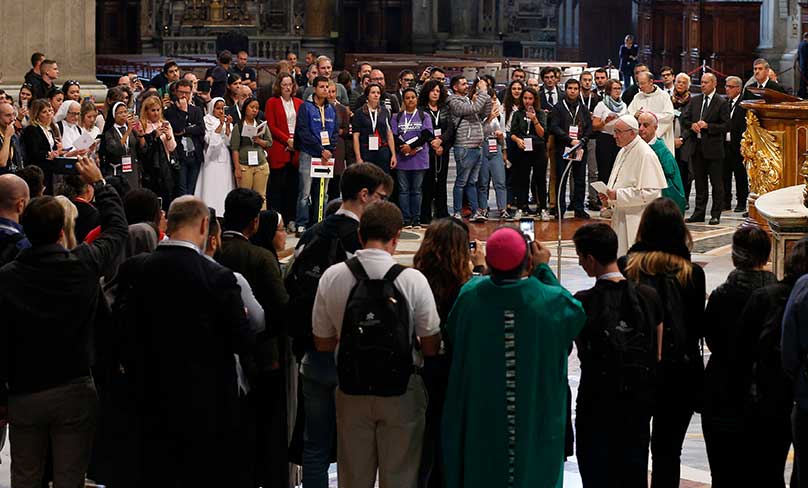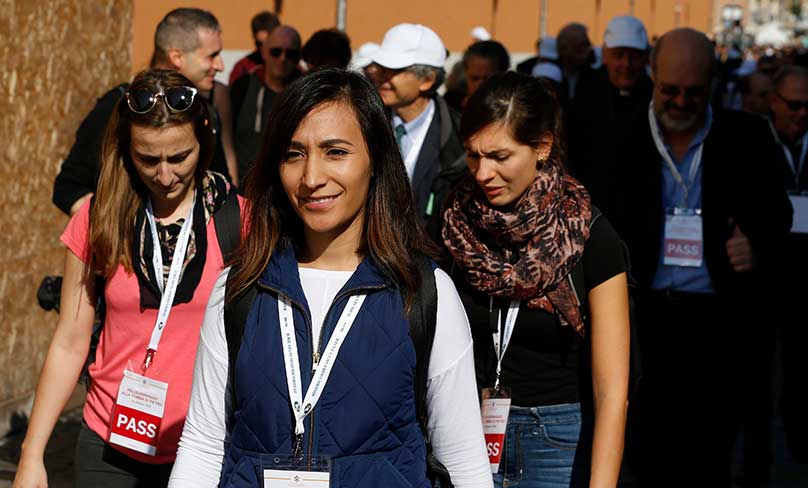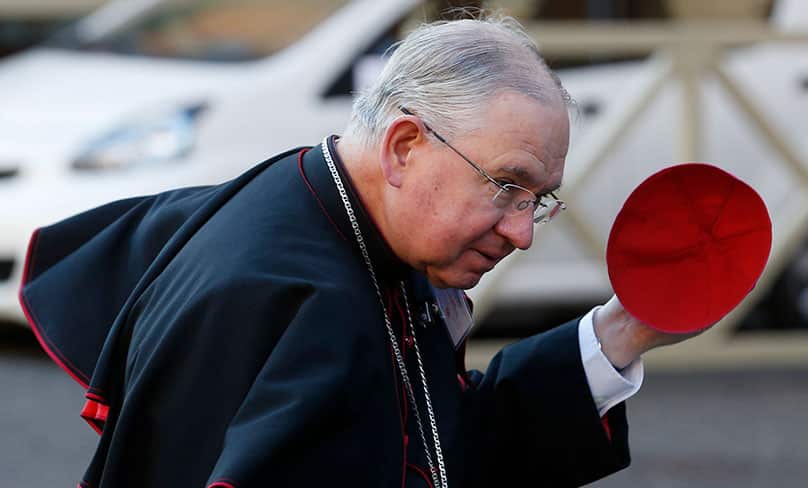
COMMENTARY
THE FIRE, THE NOURISHMENT, AND THE LOVE
There has been an eerie – or, if you prefer providential – synchronicity between the liturgical texts of the past month and the goings-on at Synod-2018. Yesterday was a good example.
The Gospel reading for Thursday of the Twenty-Ninth Week of the Year began with one of the most striking dominical sayings in the New Testament: “I came to cast fIre on the earth; and would that it were already kindled!” [Luke 12.49]. This was preceded by the recitation of Psalm 33, which concludes in these evocative terms: “…the eyes of the Lord are upon those who fear him/upon those who hope for his kindness/to deliver them from death/and preserve them in spite of famine.” Just before that, St. Paul consoled the Ephesians with the promise of this prayer for them:
I kneel before the Father, from whom every family in heaven and on earth is named, that he may grant you in accord with the riches of his glory to be strengthened with power through his Spirit…and that Christ may dwell in your hearts through faith; that you, rooted and grounded in love, may have strength to comprehend with all the holy ones what is the breadth and length and height and depth, and to know the love of Christ that surpasses knowledge, so that you may be filled with the fullness of God. [Ephesians 3.14-19]
Each of these texts prompts a brief reflection on Synod-2018 as its work draws to a close tomorrow.
Casting fire
One of the many divisions in the Church that this Synod has bought into bold relief is the fault-line between those bishops (and other Synod participants and commentators) who take the Lord’s determination to set the world ablaze seriously, and those who prefer a more comfortable, culturally-snug Catholicism, at home in the world while perhaps calling it on occasion to behave itself just a bit better (ecologically, politically, whatever). The African bishops at the Synod have known Pentecostal fire in their local Churches, which are growing by leaps and bounds as the people of sub-Saharan Africa find in the Gospel a liberation from ancient prejudices and practices, and discover in the charity and solidarity of Christian community an alternative to the grim future sought by jihadist Islam. And while the African bishops are unfailingly courteous, one gets the sense that, beneath the politeness, they have to be wondering what the heck happened to those bishops and local Churches where the fire of the Holy Spirit seems to have been extinguished. In this respect, Cardinal Walter Kasper’s (hopefully inadvertent but certainly revealing) put-down of the Africans at the last Synod, whom he described as churchmen somehow behind the curve intellectually and culturally, has been a blessing over the long haul: these African bishops are not going to be patronized by their putative Euro-betters, and no matter what concessions some parts of the Church in the global North want to make to the Zeitgeist (especially in terms of the sexual revolution), they’re going to keep casting fire on the earth by offering their people life-transforming friendship with Jesus Christ and incorporation into his Body, the Church.
It’s hard imagine young adults being attracted to a Church whose fires of evangelical passion have been banked as it concentrates its energies on fighting the plague of plastic refuse. No doubt today’s young adults are environmentally conscious. But Gaia will not satisfy their deepest longings, Like Moses in his first encounter with YHWH on Mt. Sinai in the third chapter of the book of Exodus, young adults are attracted to a fire that burns brightly but does not self-extinguish. Like Moses, they are drawn to the fire and want to know what it signifies. And when that meaning – holiness – is announced to them from within the fire, they are transformed. Catching the fire, they want to spread it to others.
Synod-2018’s Instrumentum Laboris was singularly lacking in fire. What fire there has been at this Synod has been, in the main, provided by bishops elected by their episcopal conferences, not those who are here by papal appointment (which means, in practice, by the choice of the Synod managers). Happily, there is a bit of evangelical fire in the draft final report and it may be hoped that other flames may be kindled before this is all over.
Young adults, in whatever cultural context the Church finds them, deserve nothing less than the fire the Lord determined to cast on the earth.
In a time of famine
There have been moving testimonials at Synod-2018, from both bishops and Synod auditors, to the dire situation Catholic young adults confront in various parts of the world. One Pakistani young man told several bishops that if “LGBT” language appeared in the Synod’s final report, he and the fellow-Catholics in his town would have to be issued Vatican passports, as their homes would be burned down by radical Islamists already persuaded that Catholics are dangerous infidels. Still others spoke of chronic, low-grade wars, and sometimes heated wars; of droughts and famines; of broken economies in which young people cannot find work. All of this stood in sharpest contrast to the concerns expressed by some European and Latin American bishops, and the occasional American outlier, which seemed to have more to do with accommodating the surrounding culture than converting it.
Much of the Church is living in a time of famine: real famine, in the sense of physical hunger; spiritual famine, in a West become dessicated by indulgence and a worship of the false gods of self-assertion and pleasure; cultural famine, in an communications environment in which social media, for all its possibilities, has also dumbed down conversation while eroding norms of decency and courtesy. The Psalmist prays that those who fear God – those who find the fire attractive, not repellant – will experience the Lord’s kindness and be delivered from famine, including the starvation of a death leading to personal oblivion. In its last two days, Synod-2018 should ponder whether it will offer young adults real sustenance for the journey of life: which is to say, whether it will boldly proclaim Jesus Christ as the answer to the question that is every human life.

That cannot be done by discussions of “synodality” – the theme being strenuously pressed this past Wednesday afternoon during a brisk synodal debate by my old friend Cardinal Christoph Schoenborn, O.P., Cardinal Carlos Aguilar-Retes of Mexico City, and Father Antonio Spadaro, S.J., the editor of La Civiltà Cattolica whose ubiquity reminds some of the role played in Renaissance pontificates by the cardinal nipote (“cardinal nephew”), albeit without the family connection or the red hat. For all their enthusiasm, though, these worthy gentlemen seem unable to define “synodality” with any precision. And when they try, they quickly bump up against key aspects of the Second Vatican Council’s teaching in its central document, the Dogmatic Constitution of the Church, Lumen Gentium. In any case, this was supposed to be a Synod on “Youth, the Faith, and Vocational Discernment,” and it remains unclear to many how “synodality” feeds the hunger of the young for the truth embodied in Jesus Christ. One might even say, remembering Matthew 7.9, that thrusting “synodality” into this discussion is offering one’s children a stone, not bread.
The bold proclamation of Christ cannot be done either by vacillating or corrupt leadership. The scandal of clerical sexual abuse, and the further scandal of episcopal malfeasance in confronting that abuse, has hung over Synod-2018 like the polluted sandy air that sometimes chokes Rome as it crosses the Mediterranean. The Synod’s draft final report confronts this, but more than recognition of these scandals is needed. The restoration of clerical rectitude in all grades of Holy Orders and the revivification of the virtue of chastity among the ordained ministers of the Church is not an ultimate goal; it is a first step toward the goal of realizing the New Evangelization. Beyond that, young adults need bishops who are primarily devoted to feeding their people in time of famine: bishops who are teachers and sanctifiers first and administrators later (which means bishops who have had the wit to get competent lay people around them to attend to a lot of diocesan management).
Rooted and grounded in love
As the editor of these LETTERS and several of its contributors have noted, Synod-2018 has spent rather more time on sex than on love. This has not been unimportant. The Church’s sexual ethic, when proposed by means of John Paul II’s Theology of the Body, is a powerful evangelizing tool among young adults, and the Synod had to be reminded of that, for its working document seemed wholly ignorant of this striking reality in contemporary pastoral life. There has also been an oddity here, however. Some bishops, auditors, and Synod managers seem determined to insert all sorts of non-ecclesial code words into the Synod’s discussion of human sexuality – and effort that charity requires us to think is an attempt to clear away an obstacle to evangelization. But that misguided attempt in fact makes matters worse for evangelism in the already-challenging circumstances of the West, where mass confusion about our embodiedness as male and female reigns supreme at the moment, and where adopting cultural code-words constitutes a tacit act of surrender to the bullying tactics of Catholicism’s cultured despisers.
Yet as St. Paul told his Ephesians, “the love of Christ…surpasses all knowledge,” and offers us the possibility of being filled to overflowing “with all the fullness of God” [Ephesians 3.19]. The Catholic Church, as noted in this space before, is not, or should not be, sex-obsessed. The Catholic Church is and must be ever more clearly love-obsessed. And what the Catholic Church says about the world’s sex-obsession, even critically, the Church says because it knows that many of those obsessions are counterfeits of love and impediments to the experience of true love that every human heart seeks.
From wherever the testimony has come at Synod-2018, it’s clear that the 21st-century world is suffering from a deficit of love. And love, in its supreme form, is what the Church offers a love-starved world. Love and “vocational discernment,” a theme of Synod-2018, go together. For “vocational discernment,” rightly understood, is the discovery of someone’s path toward the love in which, and for which, we all want to live.
The greatest of modern young-adult saints and the only young adult to be declared a Doctor of the Church – St. Therese of Lisieux – embraced her vocation when it became clear to her that “…love is everything,” that “…love is everlasting,” and that she would “be love in the heart of the Church.” In its Liturgy of the Hours, the world Church read that excerpt from the Little Flower’s Autobiography two days before Synod-2018 opened. St. Therese’s commitment to “be love” ought to have been one of the main motifs in the Synod’s deliberations, and sometimes was. We may hope that it infuses the Synod’s final report and whatever else comes out of Synod-2018, including an apostolic exhortation from Pope Francis.
– George Weigel

TESTIMONY FOR THE SYNOD
[The following column by Archbishop José H. Gómez of Los Angeles appears in the archdiocesan newspaper, The Angelus, today. It seemed to your editor to strike an apt note at the end of a Synod devoted to “Youth, the Faith, and Vocational Discernment.” XR II]
DO NOT BE AFRAID TO BE SAINTS!
I am writing to you again from Rome and today [October 22] we are celebrating the memorial of St. John Paul II, on the 40th anniversary of his el ection as pope.
And as we enter the final week of the Synod Hof Bishops on young people, it is good to remember that he is the one who started World Youth Day and he raised up many young people as saints. In fact, at the Cathedral of Our Lady of the Angels, we have opened a new chapel to one young saint that he beatified, St. José Sánchez del Río, a 14-year-old martyred for his faith during the persecutions in Mexico in the 1920s.
St. John Paul called young people to greatness, he challenged them to give their lives to Jesus Christ and to share in his mission. “Do not be afraid to be saints!” he would say.
The Synod is urging all of us in the Church to make a renewed commitment to walking with our young people. “Accompaniment” has been one of the watchwords of this Synod.
And as we walk together, we need to always keep in mind that our journey has a destination. We are on our way to God our Father, who is the source of love and the reason and meaning of our lives.
Always, when we accompany young people in the Church, we are walking with Jesus Christ — following him with love, living according to his words, teachings and example. In fact, we can only reach our destination by following the path that he shows us. If we are not walking together according to his way, we are only walking in circles.
Accompanying young people means calling them to conversion as Jesus did, calling them to open their hearts and change their lives so they can know the love of God and his plan for their happiness.
This is the beautiful truth that the Church is called to proclaim to the world — and to proclaim in a special way in this moment to our young people.
I wonder sometimes if we have lost some of our confidence in this truth.
The sorrows in the world, the scandals, the overwhelming materialism and consumerism in our technological society. All of this tends to close our eyes to God’s presence, to any sense that there is a transcendent dimension to reality.
In many practical ways, we live in a world where God does not matter anymore. And it becomes harder to believe that there is more to reality than what we can see and experience with our senses. It becomes harder to believe that there are permanent truths, beyond what we can discover with our science and technology.
I have been reflecting on this a lot during this Synod.
We have the truth and the world is waiting for our witness. But we cannot share what we are not living.
In this moment in the Church, I really believe that all of us need to make a new act of love for Jesus. We need to pray for deeper faith, for new hope in the power of his cross and resurrection.
We need to believe that Jesus alone holds the words of life — that in his teaching we will find the happiness that God wants for us in this world and a love that never ends in the world to come.
This is what young people are looking for from the Church — leaders they can trust to tell them the truth about life.
“Listening” has been another watchword of the Synod. Throughout this Synod, in the hall with the bishops every day, there have been young people — speaking to us about their lives, challenging us with their questions.
These young people want to know the truth. The real truth. Not our personal ideas or preferences. They do not want to be told what we think they want to hear. Young people want to know what answer Jesus gives.
This is what St. John Paul told them. He was not afraid to talk tough to young people. He called them to greatness, but he wanted them to be realists, too. The way of Jesus can lead to the cross, but there is no other way to find truth and life, he said.
He warned that along with the pollution of the natural world “there exists also a pollution of ideas and morals which can lead to the destruction of man. The pollution is sin, from which lies are born.”
Strong words, but they are true. And they remind us why the truth is essential in our mission young people.
Pray for me in this week and I will be praying for you here in the Eternal City. And keep praying for Pope Francis and my brother bishops and I here at the Synod.
And let us ask our Blessed Mother Mary to pray for the Church, that we might call all our young people to have the courage to be saints.
